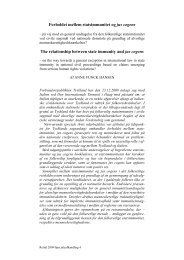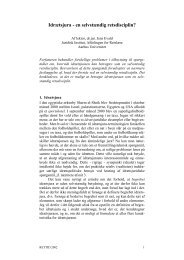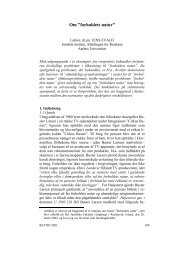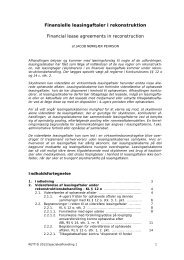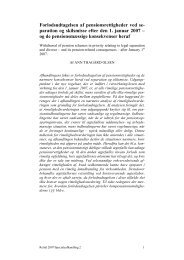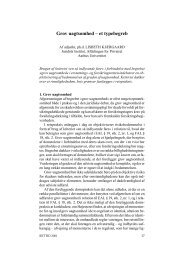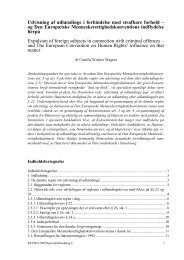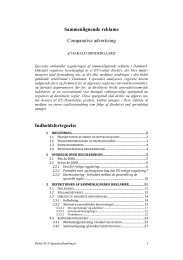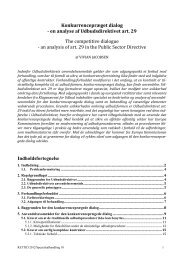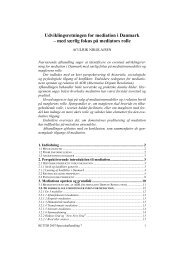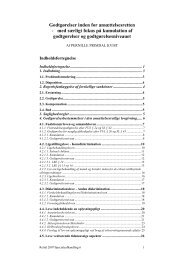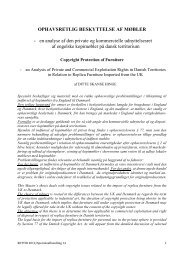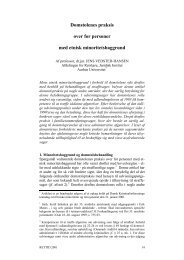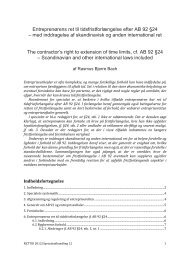<strong>CSR</strong> <strong>LRN</strong> <strong>Newsletter</strong> Page 2New publicationsHåndhævelse af danske virksomheders samfundsansvar gennem Mæglings- og Klageinstitutionen (in Danish)Birgitte Egelund OlsenProfessor, Aarhus University, Department of LawJuristen, No. 2, 2013, pp. 54-67.Karsten Engsig SørensenProfessor, Aarhus University, Department of LawAbstract:The article takes a starting point in an analysis of the Danish National Contact Point (NCP) established under theOECD Guidelines for Multinational Enterprises. To comply with the 2011-revision of the OECD Guidelines, the DanishNCP was fundamentally reformed in 2012 with the adoption of a new Act on the establishment of a Mediationand Complaints Board for Responsible Business Conduct. The approach of the Danish NCP is in the articlecompared with the approach of the Norwegian and the British NCPs with the aim of examining how the activitiesof the NCPs may change the Guidelines nature from being purely voluntary to more binding requirements.Conformance and Deviance: Company Responses to Institutional Pressures for Corporate Social ResponsibilityReportingEsben Rahbek Gjerdrum Pedersen, Peter Neergaard, Janni Thusgaard Pedersen, Wencke GwozdzBusiness Strategy and the Environment(early view, http://onlinelibrary.wiley.com/doi/10.1002/bse.1743/abstract)Abstract:This paper analyses how large Danish companies are responding to new governmental regulation which requiresthem to report on corporate social responsibility (<strong>CSR</strong>). The paper is based on an analysis of 142 company annualreports required by the new Danish regulation regarding <strong>CSR</strong> reporting, plus 10 interviews with first-time reportingcompanies and six interviews with companies that failed to comply with the new law. It is concluded thatcoercive pressures from government have an impact on <strong>CSR</strong> reporting practices. Further, the analysis finds tracesof mimetic isomorphism which inspires a homogenisation in <strong>CSR</strong> reporting practices. Finally, it is argued that nonconformancewith the new regulatory requirements is not solely about conscious resistance but may also becaused by, for example, lack of awareness, resource limitations, misinterpretations, and practical difficulties.Mapping of Danish law related to companies’ impact on environment climate changeKarin Buhmann, Kim Østergaard, Rasmus Kristian Feldthusen, Helle Tegner Anker, Franz Amdi Hansen, KarstenEngsig SørensenNORDIC & EUROPEAN COMPANY LAW, LSN Research Paper Series, No. 10-36Available at http://papers.ssrn.com/sol3/papers.cfm?abstract_id=2257750Abstract:This overview of Danish law related to companies’ conduct and impact on environment and climate change hasbeen undertaken under the ‘Sustainable Companies’ project hosted at the Department of Private Law at theUniversity of Oslo (see http://www.jus.uio.no/ifp/english/research/projects/sustainable-companies/). The‘mapping’ of national law – including in particular company law – in various countries forms a major part of theempirical studies undertaken under that project. The ‘mapping’ of Danish law has been undertaken according toa general structure applied by all studies under the project, and the selection of issues described in here must beunderstood on that background. Environmental law has been seen under the project as essentially related toclimate change. Some other issues related to sustainable development and company conduct have beenaddressed as well, in particular in relation to Corporate Social Responsibility (<strong>CSR</strong>). In the current paper, thisparticularly applies to issues covered by the Danish <strong>CSR</strong> reporting requirement, which in addition to environment
<strong>CSR</strong> <strong>LRN</strong> <strong>Newsletter</strong> Page 3and climate change mitigation measures broadly applies to human rights, social issues such as working conditions,and anti‐ corruption measures. The ‘mapping paper’ by way of introduction describes the context for Danish lawrelated to environment and climate change and <strong>CSR</strong> in a general sense, sources of law and jurisdiction specificissues, types of companies, shareholding structure etc. (section 1); the purpose of the company, duties andcompetence of the company organs, and corporate governance issues (section 2); reporting and auditing(section 3); liability and enforcement (section 4), general observations including taxation, remuneration as aclimate change incentive, and marketing law (section 5); parent‐ subsidiary issues, including monitoring, controland duties of the company organs (section 6); and finally special enforcement issues and a general evaluation(section 7).Corporate Social Responsibility in the EU, 1993–2013: Institutional Ambiguity, Economic Crises, Business Legitimacyand Bureaucratic PoliticsDaniel KindermanAssistant Professor, Political Science and International Relation, University of DelawareJournal of Common Market Studies, 2013, pp. 1-20(early view, http://onlinelibrary.wiley.com/doi/10.1111/jcms.12021/abstract)Abstract:What drives European Union (EU) policy change in a sensitive and contentious area? To answer this question, thisarticle tells the story of corporate social responsibility (<strong>CSR</strong>) in the EU from its beginnings until the present. The EU'srole in EU <strong>CSR</strong> has changed from social-liberal standard-setter to neo-liberal cheerleader and back. This articleattempts to explain these shifts. It argues that Europe's institutional diversity hampers standard-setting whileeconomic crises and declining levels of business legitimacy facilitate it. Contention has been fuelled by <strong>CSR</strong>'sinherent ambiguity: is <strong>CSR</strong> a means to regulate the economy, or a domain of voluntary activity that must remainfree of state regulation? Fearful of regulation, business groups – German employers in particular – have forcefullyadvocated the latter view. In addition to converting EU <strong>CSR</strong> from social-liberal to neo-liberal, business hasneutralized two of the Commission's standard-setting advocates. The financial crisis, the power of arguments anddiscourse, and the impact of global policy developments in the field of <strong>CSR</strong> have re-empowered standard-setters.The article concludes with a critical analysis of the EU's renewed <strong>CSR</strong> strategy and non-financial reporting agenda.Plentiful forests, happy people? The EU’s FLEGT approach and its impact on human rights and private forestrysustainability schemesKarin BuhmannAssociate Professor, Roskilde UniversityNordic Environmental Law Journal, 2012, No. 2, pp. 53-82Abstract:Focusing on potential impact on social sustainability in timber exporting or processing states outside the EU, thisarticle discusses the EU’s Forest Law Enforcement, Governance and Trade (FLEGT) scheme and its regulatoryimplementation modalities. Drawing on Vietnam as a case study and the private Forest Stewardship Council (FSC)criteria as an example of a broader sustainability scheme, in the analysis we identify concerns of a human rights orlabour rights character that risk becoming institutionalised in an adverse fashion as a result of the FLEGT’s scheme’slegality orientation with regard to exporting states as well as importers who place timber on the EU market, andthe assumption that civil society involvement in exporting states will sufficiently ensure consideration of suchconcerns. Next we consider potential adverse impact on the usage of broader sustainability schemes, such asFSC, which address social sustainability as well as the environment but do not (yet) deliver legality verificationrequired by the EU Timber Regulation from March 2013. We also discuss possible contributions that could followfrom adding a Corporate Social Responsibility (<strong>CSR</strong>) perspective to the FLEGT approach, given increasing



